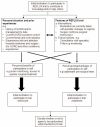Reasons for participating in randomised controlled trials: conditional altruism and considerations for self
- PMID: 20307273
- PMCID: PMC2848220
- DOI: 10.1186/1745-6215-11-31
Reasons for participating in randomised controlled trials: conditional altruism and considerations for self
Abstract
Background: Randomised controlled trials of healthcare interventions depend on the participation of volunteers who might not derive any personal health benefit from their participation. The idea that altruistic-type motives are important for trial participation is understandably widespread, but recent studies suggest considerations of personal benefit can influence participation decisions in various ways.
Methods: Non-participant observation of recruitment consultations (n = 25) and in-depth interviews with people invited to participate in the UK REFLUX trial (n = 13).
Results: Willingness to help others and to contribute towards furthering medical knowledge featured strongly among the reasons people gave for being interested in participating in the trial. But decisions to attend recruitment appointments and take part were not based solely on consideration of others. Rather, they were presented as conditional on individuals additionally perceiving some benefit (and no significant disadvantage) for themselves. Potential for personal benefit or disadvantage could be seen in both the interventions being evaluated and trial processes.
Conclusions: The term 'conditional altruism' concisely describes the willingness to help others that may initially incline people to participate in a trial, but that is unlikely to lead to trial participation in practice unless people also recognise that participation will benefit them personally. Recognition of conditional altruism has implications for planning trial recruitment communications to promote informed and voluntary trial participation.
Trial registration: ISRCTN15517081.
Figures
Similar articles
-
How informed is declared altruism in clinical trials? A qualitative interview study of patient decision-making about the QUEST trials (Quality of Life after Mastectomy and Breast Reconstruction).Trials. 2016 Sep 2;17(1):431. doi: 10.1186/s13063-016-1550-7. Trials. 2016. PMID: 27590594 Free PMC article.
-
Patients or research subjects? A qualitative study of participation in a randomised controlled trial of a complex intervention.Patient Educ Couns. 2006 Aug;62(2):260-70. doi: 10.1016/j.pec.2005.07.013. Epub 2005 Sep 21. Patient Educ Couns. 2006. PMID: 16181766
-
Factors that impact on recruitment to randomised trials in health care: a qualitative evidence synthesis.Cochrane Database Syst Rev. 2020 Oct 7;10(10):MR000045. doi: 10.1002/14651858.MR000045.pub2. Cochrane Database Syst Rev. 2020. PMID: 33026107 Free PMC article.
-
Deciding to join a perinatal randomised controlled trial: experiences and views of pregnant women enroled in the Magpie Trial.Midwifery. 2012 Aug;28(4):E478-85. doi: 10.1016/j.midw.2011.08.006. Epub 2011 Sep 22. Midwifery. 2012. PMID: 21944570
-
Involving South Asian patients in clinical trials.Health Technol Assess. 2004 Oct;8(42):iii, 1-109. doi: 10.3310/hta8420. Health Technol Assess. 2004. PMID: 15488164 Review.
Cited by
-
Ways of Hoping: Navigating the Paradox of Hope and Despair in Chronic Pain.Cult Med Psychiatry. 2016 Mar;40(1):35-58. doi: 10.1007/s11013-015-9465-4. Cult Med Psychiatry. 2016. PMID: 26194780 Free PMC article. Clinical Trial.
-
Do people with epilepsy want to participate in an exercise intervention randomized controlled trial? - Results of a brief survey and its preliminary application.Epilepsy Behav Rep. 2023 Nov 4;24:100632. doi: 10.1016/j.ebr.2023.100632. eCollection 2023. Epilepsy Behav Rep. 2023. PMID: 38025406 Free PMC article.
-
Can HIV vaccines be shared fairly? Perspectives from Tanzania.BMC Med Ethics. 2022 Dec 15;23(1):135. doi: 10.1186/s12910-022-00874-w. BMC Med Ethics. 2022. PMID: 36522782 Free PMC article.
-
Willingness to Participate and Associated Factors in a Zika Vaccine Trial in Indonesia: A Cross-Sectional Study.Viruses. 2018 Nov 18;10(11):648. doi: 10.3390/v10110648. Viruses. 2018. PMID: 30453663 Free PMC article.
-
The ethical anatomy of payment for research participants.Med Health Care Philos. 2022 Sep;25(3):449-464. doi: 10.1007/s11019-022-10092-1. Epub 2022 May 24. Med Health Care Philos. 2022. PMID: 35610403 Free PMC article.
References
-
- Featherstone K, Donovan JL. "Why don't they just tell me straight, why allocate it?" The struggle to make sense of participating in a randomised controlled trial". Social Science & Medicine. 2002;55:709–719. - PubMed
Publication types
MeSH terms
Associated data
Grants and funding
LinkOut - more resources
Full Text Sources


